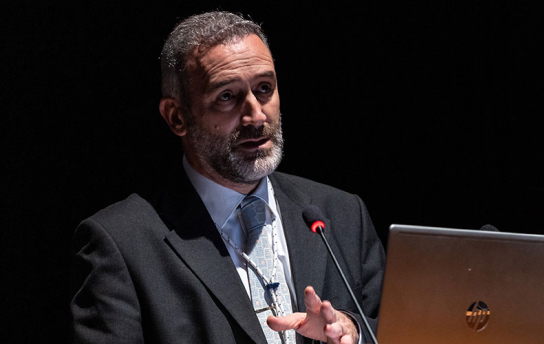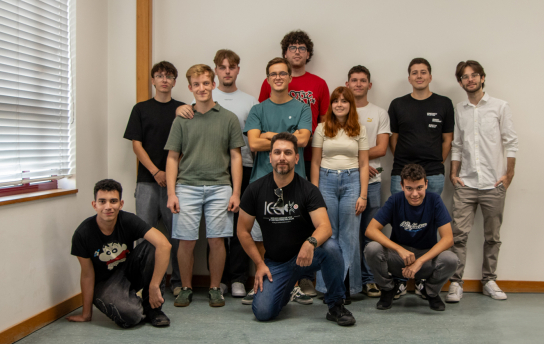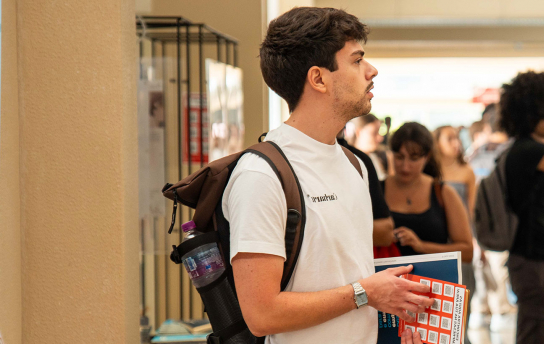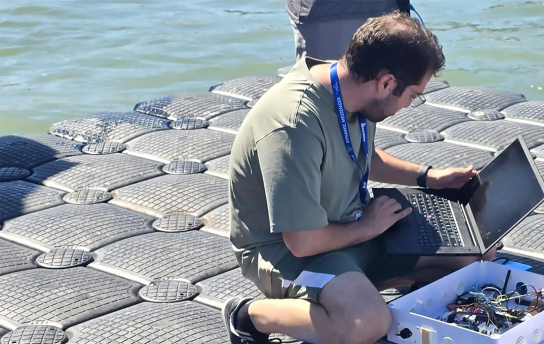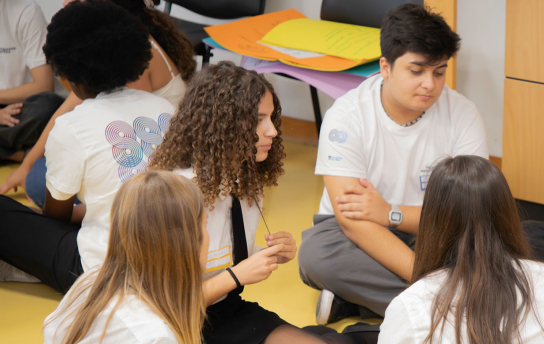José Sobral, a faculty member at ISEL in the Department of Mechanical Engineering (DEM/ISEL), was awarded a Certificate of Merit at the PAMDAS 2025 – International Conference on Physical Asset Management and Data Science. The recognized paper, titled "Optimizing asset management through reliability data analysis", was presented by the professor and researcher at the event, which took place on July 17th and 18th, 2025, at the Instituto Superior de Engenharia of the Polytechnic Institute of Coimbra.In an era where the Digital Transition (DT) is impacting all areas of industry and human life, PAMDAS 2025 brought together researchers who, through plenary talks, thematic sessions, and workshops, shared their work and established connections with peers interested in the challenges and opportunities presented by DT in Physical Asset Management, Data Science, and related fields.
AERIS (Aerospace Engineering and Rocketry at ISEL) is the latest project developed by students at ISEL, within the scope of the Aerospace Engineering Student Group (NEA). Its main goal is the design and construction of experimental rockets, integrating various fields of engineering and promoting the practical application of knowledge acquired in an academic context.Currently, the group includes students from the undergraduate programs in Electronics, Telecommunications and Computer Engineering (LEETC), Electrical Engineering (LEE), Applied Physics Engineering (LEFA), Mechanical Engineering (LEM), and the Master's in Electrical Engineering (MEE). It is open to students from any university who share an interest in engineering and space exploration. The team’s first official meeting took place on October 3, 2025, marking the beginning of an initiative that offers ISEL students the opportunity to make their mark on the European aerospace engineering scene.AERIS will be developed across several missions, each corresponding to a unique rocket designed and built by the students, with support and guidance from ISEL faculty. The ultimate goal is to participate in the European Rocketry Challenge (EuRoC), the largest experimental rocketry competition in Europe, where university teams from across the continent present and launch their projects.Speaking about the spirit behind the project, Miguel Monteiro, AERIS mentor and LEFA student, emphasizes: “At AERIS, we bring together knowledge, innovation, and team spirit to develop experimental rockets and represent ISEL in international competitions. Each member contributes with their talent and dedication, because we believe that alone we go fast, but together we go far.”The project is promoted by the Aerospace Engineering Student Group (NEA), recently created by ISEL students, with the following goals:Involve students from different courses at the institute;Strengthen collaboration between students, faculty, and industry;Showcase ISEL’s capacity for innovation and applied research.
Aiming to connect students with the professional world and reinforce ISEL's role as a benchmark in training qualified engineers, another edition of the ISEL Job Fair was held from September 30th to October 2nd.This year, the event featured the participation of 96 national and international companies from various fields of engineering, chemistry, physics, and technology. They are seeking qualified young talent at ISEL, prepared for the challenges of the job market. Over the three days, the event registered approximately 600 registrations from students seeking internship, employment, and networking opportunities with leading companies.The participation of companies demonstrates the growing recognition of the quality of education and the technical preparation of ISEL students, as well as the interest in integrating professionals trained at an institution that combines tradition with innovation and proximity to industry.The Job Fair is, therefore, more than just a recruitment opportunity; it is essentially a bridge between higher education and the business world. This event actively contributes to career development and strengthens the employability of future engineers.With this edition, ISEL consolidates its role as a privileged space for connecting talent and opportunity, reinforcing its commitment to continuing to train professionals who are up to the challenges of an increasingly demanding and dynamic market.
[flickr-photoset:id=72177720329541434, size=q, num=10]Ver no flickr
ISEL participated in Naval-REX25, part of REPMUS 2025 (Robotic Experimentation and Prototyping with Maritime Unmanned Systems), the world's largest exercise in robotics and unmanned vehicles at sea. The event, organized by the Portuguese Navy, began on September 8th in Tróia and Sesimbra and attracted over 2,000 participants from 32 countries.ISEL was represented by Professor Carlos Gonçalves (DEI/ISEL) and Alexandre Figueiredo, a student in ISEL's Master's in Informatics and Multimedia Engineering program. He participated in the initiative as part of his Master's thesis, which consists of developing a cyber-physical system for autonomous control of Unmanned Surface Vehicle (USV) vessels. The system is being developed in a modular, expandable format, focused on the integration of multiple motors, sensors, and communication interfaces, ensuring robustness and adaptability to different operational scenarios.This participation was in collaboration with the Infante D. Henrique Nautical School (ENIDH), which led the Portuguese team, also bringing together members from the Instituto Superior Técnico and Universidade Nova. The presented works covered areas such as robotic sailing, autonomous vessels, communications, solar energy, and navigation algorithms, reflecting the national commitment to integration between academia and the defense and security sectors.This participation represents ISEL's commitment to supporting academic projects connected to the professional environment and current technological challenges.
The Polytechnic of Lisbon's Peer Mentoring Program - MENTori@IPL - officially began with the first sessions of the 2025/2026 edition. The initiative, now in its fifth year, implemented in six of the eight IPL schools (ESCS, ESD, ESELx, ESSL, ISCAL, and ISEL), aims to support the integration of students now entering higher education by fostering close relationships, sharing, and support among peers.The first session of the initial mentor training took place on September 2, 2025, at the Escola Superior de Comunicação Social (ESCS), in the Vítor Macieira auditorium. It featured several integration activities for the student mentors, aiming to create an initial informal connection between participants. During the opening ceremony, the host, ESCS President André Sendin, reinforced the active role of everyone involved, emphasizing: "I continue to support these programs because I believe it's not just about helping others integrate, it's also about integrating ourselves. I hope you enjoy this mentoring program."In the same session, Cristina Borges de Azevedo, IPL Vice President for Academics, Pedagogical Innovation, Quality, and Erasmus+, praised the volunteer spirit of the participating students, emphasizing IPL's commitment to promoting the integration of new students as an opportunity for academic, personal, and social enrichment. He also highlighted this year's new feature: the MENTori@IPL program is now part of the newly created Student Support Center, a multifunctional structure dedicated to the well-being and support of the student community. João Lobato, administrator of the IPL's Social Action Services, spoke of the importance of mentors' role in building a more cohesive and collaborative academic community. "Those who signed up for this program have a special calling: they are agents of social animation and leadership. This is an important step toward improving the ecosystem within institutions." Conceição Soares, a psychologist with the Psychological and Educational Support Services (SAPE), argued that the program should focus on human connections: "We want to combat what is already known as 'relational winter.' This should be a program focused on fostering relationships, which are our first line of support in any challenging or difficult situation."The second MENTori@IPL mentor training session took place at the Instituto Superior de Engenharia de Lisboa (ISEL), in the auditorium on the 3rd floor of Building C, on September 9, 2025. The training, lasting approximately five hours and mandatory for new mentors, included morning sessions with institutional interventions, welcoming moments, and reflection activities on the role and responsibilities of the mentor, including tips for resolving challenging situations. The program's stages, schedule, and forms of recognition for participation (certificate, diploma completion, and scholarship) were also presented. During the afternoon, the new mentors joined colleagues from previous sessions to share testimonials and group dynamics, reinforcing integration and active involvement in the academic community.This year, mentor training began earlier to expedite the process of assigning mentors to newly admitted students, who are already registering as mentees.By the date of the second initial training session, 232 mentors had signed up, 74 of whom had already served in this role last academic year. Registration will continue, and new training sessions will be held to further expand the MENTori@IPL Program. This academic year, the program will also launch an ongoing mentor training program throughout the academic year, based on the five basic relational acts: respect, listen, help, communicate, and share information. About the MENTori@IPL ProgramMENTori@IPL is coordinated by the Social Action Services of the Polytechnic of Lisbon (SAS-IPL), in collaboration with the schools and institutes that comprise the IPL. The program was created in the 2021/2022 academic year and aims to promote the integration of new students into their school and program, as well as their personal and academic development. By focusing on these core objectives, it will be possible to contribute to broader outcomes, notably academic success and the development of engaged citizens. [flickr-photoset:id=72177720328834234, size=q, num=10]Ver no flickr Texto de MFC/GCI/IPLImagens de JC/GCI/IPLVideo de BP/GCI/IPL
ISEL welcomed 34 students under the Erasmus+ program last Wednesday, September 10th, who are now beginning their academic experience in Lisbon.Of the total participants, 15 are pursuing master's degrees and 19 are pursuing bachelor's degrees, representing 13 different nationalities: Hungary, Germany, Lithuania, Spain, Italy, Turkey, the Czech Republic, France, Belgium, Poland, the Netherlands, Brazil, and Romania.The new students will study nine different areas of study, including: Civil Engineering, Electrical Engineering, Electronic, Telecommunications, and Computer Engineering, Mechanical Engineering, Mathematics Applied to Technology and Business, Industrial Engineering and Management, Computer and Computing Engineering, Computer and Multimedia Engineering, and Chemical and Biological Engineering.The welcome session included an institutional reception, a presentation of ISEL's services, and a guided tour of the campus.

